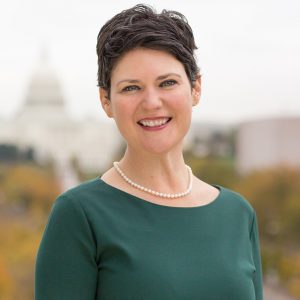
By BJC Executive Director Amanda Tyler
 It’s once again autumn in an even-numbered year, which of course means it is football and election season. I’m hoping that my team, the Texas Longhorns, is finally turning the corner after a long string of disappointing seasons. They passed their first real test at the “Red River Showdown” against the Oklahoma Sooners with a narrow and exhilarating victory. For one Saturday in October each year, the Cotton Bowl in Dallas is split – burnt orange on one side, crimson on the other. The winner in this annual contest comes away with not just a victory but also taunting rights for the next year.
It’s once again autumn in an even-numbered year, which of course means it is football and election season. I’m hoping that my team, the Texas Longhorns, is finally turning the corner after a long string of disappointing seasons. They passed their first real test at the “Red River Showdown” against the Oklahoma Sooners with a narrow and exhilarating victory. For one Saturday in October each year, the Cotton Bowl in Dallas is split – burnt orange on one side, crimson on the other. The winner in this annual contest comes away with not just a victory but also taunting rights for the next year.
Campaigns for public office are increasingly resembling college football rivalries. Passionate supporters of both “teams” engage in verbal sparring leading up to the big “game.” Political parties have even adopted colors – red for Republicans, blue for Democrats – so partisan supporters can wear their allegiance.
I hope all Americans will show up to vote and exercise their rights of citizenship, not just this November but in all elections. Increasingly, though, the voting booth is not the only place we see our partisan divisions play out. In her new book, Uncivil Agreement: How Politics Became Our Identity, Liliana Mason argues that our parties have become mega-identities. If I tell you how I vote, some marketer can also tell you what neighborhood I live in, what kind of car I drive, where I get my news, what television shows I watch, and where I buy my groceries. As we’ve reduced our personhood to these two labels, she writes, our national accord has eroded, and with it social norms of religious, racial and cultural respect have withered. In 2018, Republicans and Democrats aren’t just rival teams. They are at war.
I find her thesis to be rather depressing and strikingly accurate. As we bemoan the loss of civility in our society, our partisan self-sorting may be mostly to blame. In speeches and opinion pieces written after the passing of Senator John McCain this summer, we heard calls to unify as Americans. As the anonymous “senior official in the Trump administration” wrote in the now infamous New York Times op-ed, “The real difference will be made by everyday citizens rising above politics, reaching across the aisle and resolving to shed the labels in favor of a single one: Americans.”
I am grateful that the wise yet imperfect men who set up our government made clear that regardless of our religious labels, we are all equally American. Thanks to protections in Article VI of the Constitution, which bans religious tests for public office, and the freedom of religion in the First Amendment, our citizenship is not dependent on our religious affiliation or lack thereof. That’s a good thing because Americans are remarkably diverse when it comes to religion. We can pursue unity in these divided times by recommitting ourselves – Republicans and Democrats – to living up to the principle of religious non-favoritism.
As a Christian, I take heart in Paul’s letter to the churches at Galatia, which were also struggling with tribalism. A “rival version of the faith” had come into their midst, “a different gospel,” and they were dividing themselves into teams, then over whether members needed to be circumcised. Paul argues that faith has made these distinctions and differences meaningless “for in Christ Jesus you are all children of God through faith. … There is no longer Jew or Greek, there is no longer slave or free, there is no longer male and female, for all of you are one in Christ Jesus.” (Galatians 3:26-28)
If he were writing to American churches today, perhaps Paul would add, “In Christ, there is no Democrat or Republican.” Houses of worship are some of the last community spaces where Americans routinely gather across partisan lines, though we are seeing more uniformity of voting patterns even at church. If we are to come through these hyper-polarized times, we need to protect our nonpartisan spaces and laws like the “Johnson Amendment,” which separates partisan campaign activity from 501(c)(3) nonprofits.
Though hope springs eternal, this fall could still be another difficult one for Longhorn fans. This election season promises to be brutal for all Americans, no matter which candidates win. In the midst of great diversity and difference of opinion, we can forget how much we share in common, both as Americans who benefit from religious freedom and as children of God. Reflecting on all that binds us together in our differences will help us as we strive for unity before and after November 6.
This article appears in the September/October 2018 edition of Report from the Capital. Flip through below to read via Issuu, or click here to read as a PDF.




